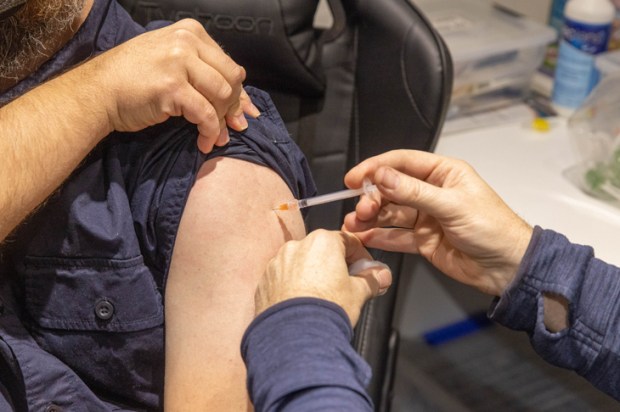Every crisis, they say, is an opportunity. And boy have health bureaucrats and drug regulators exploited the Covid-19 crisis to grab power and gain control over our lives. The latest iteration of this will play out in Brisbane on 11 October with the second reading of an amendment to the Health Practitioner Regulation National Law Act that will fundamentally reshape the relationship between doctors, patients and health regulators. It’s hard to see how people’s faith in doctors will not collapse once they realise doctors are barred from questioning putative benefits or pointing to possible risks of alternative treatments. Instead, they must stay within the boundaries laid down by bureaucrats and regulators, the latter often subject to industry capture. Readers will know the outcome by now. If it passes, the chances of reversing it are much slimmer but not hopeless at the third and final reading. If rejected, vigilance will still be required to prevent a return of a similar bill.
Consider globally divided opinion on the benefit-harm balance of Covid vaccines for children. Their risk of severe illness or death from Covid is tiny, of serious adverse reactions is higher and the long-term effects are unknown. On 7 October, Florida issued a press release recommending against mRNA Covid vaccines for 18–39-year-old males. Their analysis found an 84 per cent higher risk of cardiac-related death within 28 days of vaccination in this group. Over-60s have a 10 per cent increased risk. This complements Florida’s guidance on paediatric vaccine guidance issued in March which recommends against Covid vaccines for healthy under-18s. They note the limited risk to infants and children of severe illness due to Covid, the high prevalence of existing immunity among them, reduced vaccine efficacy and ‘higher than anticipated’ severe adverse events, including myocarditis.
Florida joins Denmark, Norway and Sweden in ending vaccine recommendations for 12–17 year olds and also, in two of these, for under 50s and 65s. The public health infrastructure and commitment to the world’s best practice public health policy of the Scandinavian countries is not inferior to that of Australia and better than that of the UK and US. Albeit contested, there is a substantial and growing body of scientific studies that support their scepticism towards the net benefits of Covid vaccines for infants, children and the young. Yet, our own Therapeutic Goods Administration has approved vaccines for children aged 0.5-5 years. In the name of public safety, will doctors have to promote the mRNA vaccines to Australian children and be forbidden to mention the other four jurisdictions’ doubts?
The existing Code of Conduct states that while ‘all doctors have a right to express their personal views and values’, they must also consider the effect of public comments and actions outside work ‘on the reputation of the profession’. Furthermore, ‘Doctors have a responsibility to promote the health of the community through disease prevention and control’. The care of the patient is the doctor’s ‘primary concern’, including ‘considering the balance of benefit and harm in all clinical-management decisions’ and informing the patient when personal opinion ‘does not align with the profession’s generally held views’. As well, AHPRA’s own advertising guidelines stipulate that doctors may neither overstate benefits nor minimise ‘the complexity of risk associated with a treatment (i.e. using words or phrases such as “safe”, “effective”, “risk-free”) without acknowledging possible adverse reactions or mixed/inconclusive evidence for the treatment’.
On 22 February, Australian federal and state health ministers approved the Health Practitioner Regulation National Law Amendment Bill in order to keep it ‘fit for purpose’. The updates to the guiding principles include ‘an increase in the regulatory responses available to protect public safety’. The communiqué concluded: ‘The Bill will now be referred for introduction to the Queensland Parliament’. A cynic might ask if Queensland was chosen because it’s easier to pass a bill there without an upper house. Once enacted, other states and territories will be asked to follow suit to preserve the ‘national’ character of the law.
The Health Practitioner Regulation National Law and Other Legislation Amendment Bill 2022, in clause 34, will replace the phrase ‘health and safety of the public’ with (1) ‘protection of the public’, and (2) ‘public confidence in the safety of services provided’ as the paramount guiding principle. At best, this is vague and ambiguous. At worst, it shifts the balance decisively from the individual-centric in liberal democracies to the collective safetyism of ‘expertocracies’, justifying restrictions on individual rights and agency for the greater good as determined by government agencies. Doctors will be prohibited from expressing their opinion and using their experience, training, education and knowledge of the patient, if this contradicts what the health bureaucrats say is in the interests of ‘public confidence in safety’. The latter will remote-control how doctors should approach treatment recommendations for patients.
Florida’s guidance includes three recommendations that are directly relevant to the proposed change to our National Law:
- People are encouraged to discuss all potential vaccine benefits and risks with their health care provider.
- The risk associated with mRNA vaccination should be weighed against that with Covid infection.
- Doctors should inform patients of the possible cardiac complications that can arise after receiving an mRNA vaccine.
This conforms fully to the existing Code of Conduct for Australian doctors but could become career-threatening with the new law. And that is at the heart of concern. A group of doctors released a short video on the 8th (https://www.youtube.com/watch?v=rgkm7GIGZaU) articulating concerns about the bill and calling for an end to medical censorship. Everything done by health bureaucrats and regulators since March 2020, in the name of ensuring public safety and stopping disinformation, indicates we should fear the worst and would be naive to hope for the best. This includes psychological manipulation of emotions and feelings to nudge people into compliance with health directives, as reported last week in the Daily Telegraph. Longstanding principles that have guided Australian doctors and ensured our health system is second to none will be undermined: the Hippocratic Oath’s duty of ‘Do no harm’, informed consent of the patient based on a harm-benefit evaluation of different treatment options, the risks associated with them in the best professional judgment of the doctor, and the sanctity of the doctor-patient relationship. ‘We are from AHPRA. We are here to keep the public safe’ are Ronald Reagan’s updated twelve most terrifying words in the English language. We should be worried, very worried.
Got something to add? Join the discussion and comment below.
Get 10 issues for just $10
Subscribe to The Spectator Australia today for the next 10 magazine issues, plus full online access, for just $10.
You might disagree with half of it, but you’ll enjoy reading all of it. Try your first month for free, then just $2 a week for the remainder of your first year.














Comments
Don't miss out
Join the conversation with other Spectator Australia readers. Subscribe to leave a comment.
SUBSCRIBEAlready a subscriber? Log in